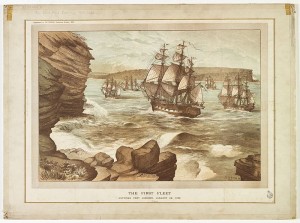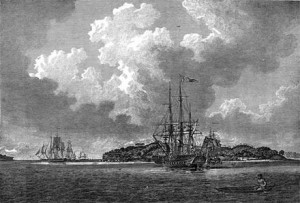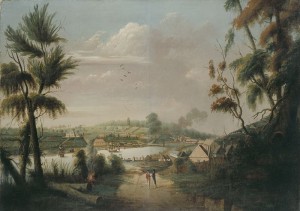Today is Australia Day! Or, if you are in Australia, then perhaps yesterday was Australia Day. This national holiday is marked by community festivities, family get-togethers, and citizenship ceremonies welcoming new citizens. Like our Fourth of July.
Australia, of course, had a much different beginning.
In the 1700s Great Britain had been using the American colonies as penal colonies, but the War of Independence put a stop to that. In need of a new land to which they might send convicts, Great Britain decided on what was then called New South Wales, one of the lands Captain Cook had explored. Cook recommended it for colonization.
 The First Fleet left England on May 13, 1787. It consisted of 11 ships, including two Royal Navy vessels, three store ships and six convict transports. More than 1,000 convicts were transported, but on board all those ships were also over 400 others: ships crews, marines, officials and passengers, and wives and children of all of them.
The First Fleet left England on May 13, 1787. It consisted of 11 ships, including two Royal Navy vessels, three store ships and six convict transports. More than 1,000 convicts were transported, but on board all those ships were also over 400 others: ships crews, marines, officials and passengers, and wives and children of all of them.
The voyage was harrowing, marred by extreme heat, rain, water rationing, and an astonishing number of vermin infestations. The voyage took over 250 days to complete. Remarkably, only 48 people died.
 The fleet first attempted landing in Botany Bay, but it was found to be more unsuitable than Captain Cook had led them to believe. Captain Arthur Phillip, the man commissioned to found the penal colony, explored the coast and discovered a better harbor and a better place to anchor, which he named Sydney Cove. On January 26, 1788, Phillip weighed anchor at Sydney Cove, marking the official beginning of the colony.
The fleet first attempted landing in Botany Bay, but it was found to be more unsuitable than Captain Cook had led them to believe. Captain Arthur Phillip, the man commissioned to found the penal colony, explored the coast and discovered a better harbor and a better place to anchor, which he named Sydney Cove. On January 26, 1788, Phillip weighed anchor at Sydney Cove, marking the official beginning of the colony.
 The first years of the settlement were difficult ones. The soil was poor, the climate unfamiliar and the many of the convicts knew nothing of farming. The marines were poorly led and less than competent, but Phillip eventually appointed convicts to oversee matters. Eventually, the penal colony prospered.
The first years of the settlement were difficult ones. The soil was poor, the climate unfamiliar and the many of the convicts knew nothing of farming. The marines were poorly led and less than competent, but Phillip eventually appointed convicts to oversee matters. Eventually, the penal colony prospered.
1808 was the first recorded celebration marking the anniversary of the First Fleet landing. The colonists began to feel a sense of pride and patriotism and marked the anniversary with “drinking and merriment” according to Historian Manning Clarke.
1818 marked the first official celebration of the anniversary. That puts it right in “our” time period!
Have you read any Regencies that involved the Australian penal colonies? I remember one where the heroine’s brother and father were transported and, in the end, the hero becomes the colony’s governor so she can search for them. Can’t remember the title, though. Anyone remember that one?

I confess, I’ve only seen the colonies briefly mentioned and only rarely.
Diane, interesting post!! I’ve never seen this used for a Regency story. Now that we have more freedom, maybe someone will!
I’ve ever only seen it mentioned –as a final fate for a villain, or as a consequence to be feared. My heroine in The Captain’s Dilemma puts herself at risk of being transported when she helps the hero. When her whole family ends up involved, she feels guilty for putting them all at risk. Wow, now you’ve got me thinking!!!